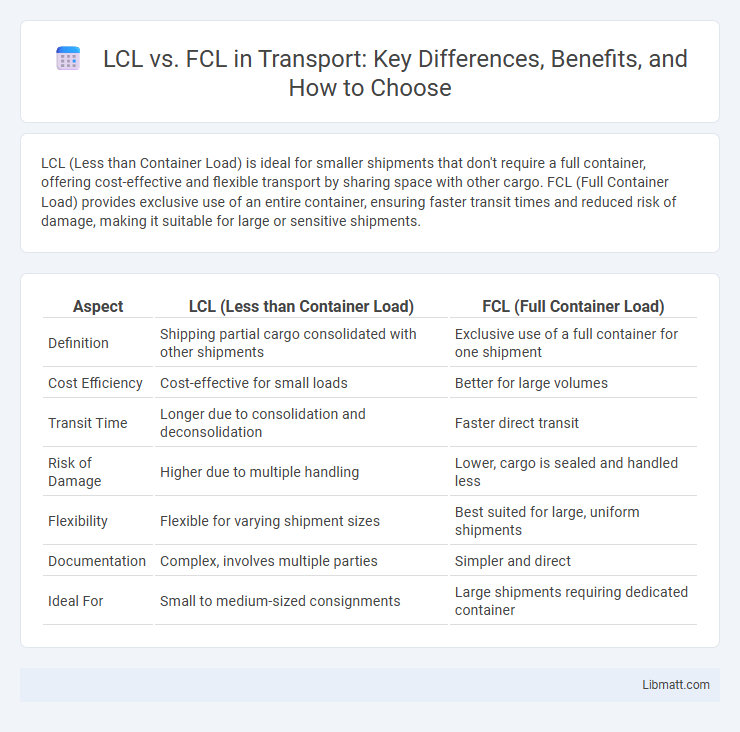LCL (Less than Container Load) is ideal for smaller shipments that don't require a full container, offering cost-effective and flexible transport by sharing space with other cargo. FCL (Full Container Load) provides exclusive use of an entire container, ensuring faster transit times and reduced risk of damage, making it suitable for large or sensitive shipments.
Table of Comparison
| Aspect | LCL (Less than Container Load) | FCL (Full Container Load) |
|---|---|---|
| Definition | Shipping partial cargo consolidated with other shipments | Exclusive use of a full container for one shipment |
| Cost Efficiency | Cost-effective for small loads | Better for large volumes |
| Transit Time | Longer due to consolidation and deconsolidation | Faster direct transit |
| Risk of Damage | Higher due to multiple handling | Lower, cargo is sealed and handled less |
| Flexibility | Flexible for varying shipment sizes | Best suited for large, uniform shipments |
| Documentation | Complex, involves multiple parties | Simpler and direct |
| Ideal For | Small to medium-sized consignments | Large shipments requiring dedicated container |
Introduction to LCL and FCL Shipping
LCL (Less than Container Load) shipping consolidates multiple smaller shipments from various exporters into a single container, making it cost-effective for businesses with lower volume cargo. FCL (Full Container Load) involves a single shipper renting the entire container, providing more control and reduced handling, ideal for large or high-value shipments. Choosing between LCL and FCL depends on shipment size, budget, and urgency, impacting logistics efficiency and cost management.
What is LCL (Less than Container Load)?
LCL (Less than Container Load) refers to a shipping method where your cargo does not fill an entire container, so it is consolidated with other shipments in one container to optimize space and cost efficiency. This option suits small to medium-sized shipments, offering flexible shipping schedules and reduced freight charges compared to FCL (Full Container Load). Choosing LCL allows your goods to be transported economically without the need to pay for unused container space.
What is FCL (Full Container Load)?
Full Container Load (FCL) refers to a shipping method where an entire container is exclusively used by a single shipper for transporting goods. This option provides increased security, reduced handling, and often faster transit times compared to Less than Container Load (LCL). FCL is ideal for large shipments that can fill or nearly fill a container, optimizing cost-efficiency and minimizing the risk of damage.
Key Differences Between LCL and FCL
LCL (Less than Container Load) involves shipping smaller cargo volumes consolidated with other shipments, optimizing cost efficiency for businesses with lower shipment volumes, while FCL (Full Container Load) offers exclusive use of an entire container, providing faster transit times and reduced handling risks. LCL shipments require more coordination due to multiple cargo consolidations, increasing potential for delays and damage, whereas FCL shipments have direct routing with lower risk of freight handling issues. Cost structures differ significantly; LCL is charged based on volume or weight, ideal for smaller loads, while FCL charges a flat rate per container, better suited for large, uniform shipments.
Cost Comparison: LCL vs FCL
LCL (Less than Container Load) shipments typically cost less upfront as you pay only for the space your cargo occupies, making it ideal for smaller shipments and budget-conscious businesses. FCL (Full Container Load) offers a fixed price for the entire container, which can be more cost-effective if your volume justifies it, reducing per-unit shipping costs and minimizing handling risks. You should evaluate shipment size, frequency, and delivery timelines to determine the most cost-efficient choice between LCL and FCL for your logistics needs.
Shipping Time and Transit Considerations
LCL (Less than Container Load) shipping typically involves longer transit times due to the need for cargo consolidation and deconsolidation at multiple ports, which can extend overall delivery schedules. FCL (Full Container Load) offers faster transit as shipments travel directly from the origin to the destination without intermediate handling, reducing delays. Shipping time for LCL can vary significantly based on the consolidation facility's efficiency and route complexity, while FCL provides more predictable and streamlined transit timelines.
Cargo Safety and Risk Factors
LCL (Less than Container Load) shipments pose higher cargo safety risks compared to FCL (Full Container Load) due to frequent handling and multiple consolidations, increasing the chance of damage or loss. FCL offers enhanced security as the cargo remains sealed from origin to destination, minimizing exposure to theft or contamination. Risk factors for LCL include improper packaging and mixed cargo types, while FCL reduces these risks through dedicated container space and fewer transfers.
When to Choose LCL Shipping
LCL shipping is ideal for businesses with smaller shipment volumes that do not require a full container load, optimizing cost-efficiency by sharing container space with other shipments. It suits companies looking to reduce inventory holding costs or those with irregular or seasonal demand, as it provides flexible shipping schedules and lower upfront expenses. Choose LCL when managing less-than-container load freight to minimize logistics costs without compromising delivery frequency or reliability.
When to Choose FCL Shipping
Choose Full Container Load (FCL) shipping when your cargo volume or weight is sufficient to fill an entire container, ensuring cost-efficiency and reduced risk of damage. FCL is ideal for high-value or fragile goods requiring exclusive use of the container for better security and faster transit times. Your shipment benefits from direct transport without intermediate handling, minimizing delays and potential contamination.
Conclusion: Making the Right Choice for Your Shipment
Choosing between LCL (Less than Container Load) and FCL (Full Container Load) depends on shipment size, cost efficiency, and delivery speed. LCL is ideal for smaller shipments seeking lower upfront costs and flexible volume, while FCL offers better security and faster transit for large or high-value loads. Evaluating shipment volume, budget constraints, and urgency ensures selecting the optimal shipping method for supply chain efficiency.
LCL vs FCL Infographic

 libmatt.com
libmatt.com